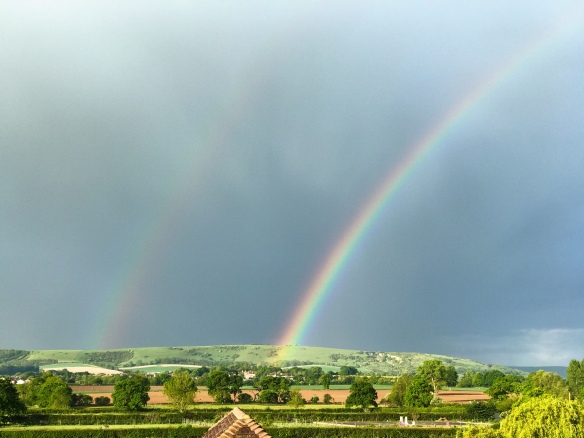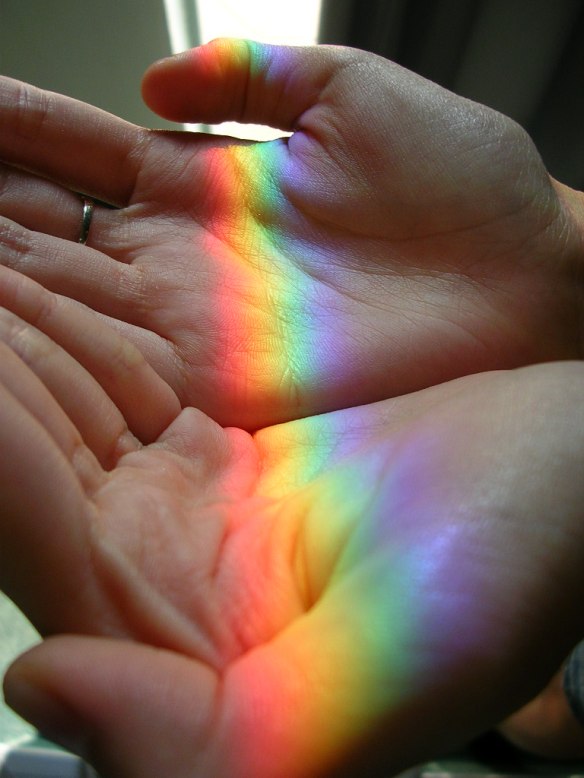
What a difference a single word can make.
I have sung this well loved hymn all my life.
O Love, that wilt not let me go,
I rest my weary soul in Thee;
I give Thee back the life I owe,
That in Thine ocean depths its flow
May richer, fuller be.
O Light, that followest all my way,
I yield my flickering torch to Thee;
My heart restores its borrowed ray,
That in Thy sunshine’s blaze its day
May brighter, fairer be.
O Joy, that seekest me through pain,
I cannot close my heart to Thee;
I trace the rainbow through the rain,
And feel the promise is not vain
That morn shall tearless be.
O Cross, that liftest up my head,
I dare not ask to fly from Thee;
I lay in dust life’s glory dead,
And from the ground there blossoms red
Life that shall endless be.
Written in 1882 by George Matheson on a day when he was left alone, his family all gone to his sister’s wedding. A moment of personal anguish. A heart-breaking memory of abandonment that had never healed, broken open afresh.
He was a bright young man and graduated from Glasgow university at age 19, destined to be an accomplished academic. He began theological studies, but his eyesight which had been failing since he was 15, let him down badly and led to errors in his work. His book The Growth of the Spirit of Christianity failed his early promise, and was harshly criticised for inaccuracies. George was crushed. A friend wrote, ‘When he saw that for the purposes of scholarship his blindness was a fatal hindrance, he withdrew from the field, not with out pangs, but finally.’ Death of a dream, and all his hopes.
At university he had fallen in love, and was engaged to be married. When he revealed his prognosis of blindness to his fiance, her response was immediate and abrupt. She could not see herself going through life as the wife of a blind man. Devastation, and abandonment, by the one he loved and trusted most.
His sister who had helped him with his studies, even learning Greek, Hebrew and Latin to do so, enabled him to take up life in the ministry. He became the minister of a church in Innellan, Argyllshire and later of a much larger church (with a 2000 strong congregation) in Edinburgh. He became famous for his preaching and writing.
Love was later to call for his sister, who became engaged to be married, leaving George for her own husband and household. He didn’t attend the wedding, feeling abandoned by the one who had stood by him, perhaps? Naturally, memories of earlier heartbreak and loss washed over him. He wrote in his journal (not disclosing the cause of his distress)..
“My hymn was composed in the manse of Inellan on the evening of June 6, 1882. I was at that time alone. It was the day of my sister’s marriage, and the rest of my family were staying overnight in Glasgow. Something had happened to me which was known only to myself, and which caused me the most severe mental suffering. The hymn was the fruit of that suffering. It was the quickest bit of work I ever did in my life. I had the impression of having it dictated to me by some inward voice than of working it out myself. I am quite sure that the whole work was completed in five minutes, and equally sure that it never received at my hands any retouching or correction. I have no natural gift of rhythm. All the other verses I have written are manufactured articles; this came like a dayspring from on high. I have never been able to gain once more the same fervor in verse.”
(Albert Lister Peace, organist wrote the tune associated with the hymn, also in five minutes.. finishing it ‘before the ink had dried’. )
Thus much was known to me. Matheson’s heartbreak poured out in the words of a hymn have spoken to hearts broken and crushed across the world, and generations in the hundred and thirtyfive years since they were written. Pain and heartbreak know no boundaries, and many tears have fallen to these words.
I woke to the view above the other morning. A double rainbow. The words of Matheson’s hymn came to mind, and I looked up the words to refresh my memory. I stumbled on an insight that blew me away.
“The original 3rd line of the 3rd stanza said “I climb the rainbow through the rain”.
It was a prosy hymnal committee of the Church of Scotland that insisted it be changed to “I trace the rainbow through the rain.” The members of the committee could not imagine anything so fanciful and farcical as climbing a rainbow! …
Finally, Matheson consented to the change with regret, permitting a line he would never have written. How sad!
A close friend of Matheson, J. Morrison of Colinton, Scotland, expressed in an article for “The Scotsman” years later:
“When “climb” was altered to “trace”, the figure of a victorious ascent of the spirit toward its divine source (a purely inner experience) was changed to passive contemplation of an external phenomenon mentally envisaged – pious and beautiful in its way, but quite different from what was originally implied.” .
For Matheson, the rainbow was like Jacob’s ladder let down from heaven for the poet’s ascent into the glory of God.
James Black, in a book published 54 years after Matheson’s death, wrote:
“It is merely silly to think of Matheson ‘tracing’ that rainbow through the rain; his eyes were shut forever! But in his own fine imagination, he could picture himself stumbling forward blindly till he actually touched the rainbow with his groping fingers! And when he touched it, he could grasp it and climb it.”
Climbing the Rainbow by Loyd J. Ogilvie ”
That metaphor of stumbling towards the rainbow, grasping it with both hands and actively climbing towards ‘its Divine Source’ is breathtakingly powerful. It transforms the hymn for me. The idea of reaching out to lay hold of God’s promises (the rainbow being the symbol of promise) hands clutching at colours, spilling through fingers is mesmerizing. Reaching out of pain to climb toward God. Laying hold of the Love that no matter what, would never let him go.

I don’t believe for a minute Matheson was triumphalistic. His words spell out the pain and heartache in bleak reality. Pain and Hope side by side, not one over the other.
He would never see another rainbow, but he would climb one instead.
You can listen to the hymn here:

yes! climb makes more sense than trace, and is far more powerful – and not at all triumphalist in context. It’s about the promise of resurrection in the darkness of Holy Saturday. Thank you for this.
LikeLiked by 1 person
Thank you for this. I have always been aware of this story and it was one of my mother’s favourite hymns – she would always sing “climb”. Your blog has helped me to flesh out my knowledge as I prepare the words to say about this hymn, which is to be sung at my mother’s celebration of life in couple of weeks.
Forgive me for mentioning this but the composer of the music was actually Albert Lister PEACE (not Pearce)
LikeLike
Thanks Hugh. It is always important to get things like names correct, and so I have amended the post accordingly. Prayers for you as you grieve your mother, and take part in her service.
LikeLike